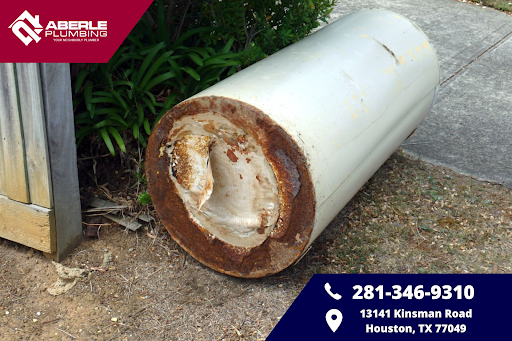
Rust on Your Water Heater: Here’s What It Means
When we think of rust, we usually picture an old, forgotten bicycle in the backyard, a neglected tool in the garage, or a car that’s seen too many winters. It’s a sign that metal has given in to time, moisture, and air. But when rust shows up somewhere unexpected — like your water heater — it can be a little unsettling.
Rust on your water heater isn’t just an eyesore; it could be a warning sign that something bigger is going on. But does it mean your water heater is on its last legs, or is it something you can fix? Let’s discuss what rust on a water heater really means.
Is Rust on a Water Heater Bad?
Short answer? Yes. Rust on a water heater is bad for several reasons.
Rust Can Lead to Water Heater Leaks
For starters, rust weakens metal. If you see rust forming on the outside of your water heater, it might not be an immediate emergency, but it’s definitely something you shouldn’t ignore. The real concern is if rust has made its way inside the tank. Once that happens, it’s only a matter of time before leaks start — and nobody wants a leaking water heater flooding their basement or utility room.
The Risk of Contaminated Water
Rust inside the tank can also lead to contaminated water. If you notice rusty water coming from your tap, shower, or kitchen sink, there’s a good chance the inside of your water heater is corroding. That’s not something you want in the water you use for cooking, drinking, or bathing.
What Causes Water Heater Rust?
There are a few causes of water heater rust, and understanding them can help you spot the problem early.
A Failing Anode Rod
Every traditional water heater has an anode rod, a metal rod inside the tank. This component is designed to attract corrosion and prevent rust from forming on the tank. Over time, this rod deteriorates, and once it’s gone, your tank is next in line for corrosion. Replacing the anode rod regularly can help extend the life of your storage tank.
Sediment Build-Up
Sediment build-up is also one of the most common causes of water heater rust. Over time, minerals and sediment settle at the bottom of your water heater’s tank. If not flushed out regularly, this build-up can lead to corrosion from the inside. If you have hard water, this happens even faster. A water softener can help reduce mineral build-up and slow down rust formation.
Leaks and Excess Moisture
Rust loves moisture. If your water heater has a small leak, it can create the perfect environment for rust to develop on the outside of the tank. A small, unnoticed leak can quickly turn into a major water damage problem, so it’s important to keep an eye on any damp spots near your unit.
High Water Pressure
If the pressure in your water heater is too high, it can weaken the metal and make it more susceptible to rust. Your relief valve should help regulate pressure, but if it’s faulty, you could be looking at a recipe for corrosion.
Age of the Water Heater
Water heaters aren’t built to last forever. Most storage tank water heaters last eight to 12 years, but as they get older, rust becomes more likely. If your water heater is over a decade old and starting to rust, it might be time to start thinking about a water heater replacement.
Signs Rust Is Coming From Your Water Heater
Now that you’re aware of the common causes of water heater rust, you may want to take a closer look at your unit. That’s because it could already be showing signs of corrosion. Sometimes, rust on your water heater is obvious. Other times, the warning signs are more subtle. Here are a few things to watch for:
- Rusty Water: If your hot water looks discolored, there’s likely rust inside of the tank.
- Rust Around the Valves and Connections: Check where the pipes connect to your water heater. If you see rust forming there, it could mean internal corrosion is already happening.
- Rusty Streaks on the Exterior: If rust is forming on the outside of your water heater, especially near the bottom, it’s a sign of moisture problems or an internal leak.
If you notice any of these, it’s time to take action before you end up with a leaking water heater.
Can Rust Be Fixed, or Do You Need a New Water Heater?
If rust is forming inside your tank, a full water heater replacement is usually the best solution. Once the tank itself starts rusting, there’s no way to reverse the damage. But if you catch the problem at an early stage, you might be able to replace a failing anode rod and extend the life of your unit.
How to Prevent Rust on Your Water Heater
While you can’t stop time, you can slow down the rusting process with regular water heater maintenance. Here are a few simple steps to help prevent rust and keep your unit running smoothly:
- Flush Your Water Heater Annually: This helps clear out sediment that can lead to rust.
- Check the Anode Rod: If it looks corroded, replace it before rust spreads to the tank.
- Inspect for Leaks: Catching a small leak early can prevent major rust problems.
- Monitor Your Water Quality: If you notice rusty water from your taps, schedule an inspection as soon as possible.
Regular maintenance can add years to your water heater’s lifespan and save you from an unexpected plumbing repair bill.
Is It Time for a New Water Heater?
If rust has taken over and repairs won’t help, it might be time to look into installing a new water heater. You have a couple of options, depending on your household’s needs.
Traditional Water Heaters
A standard hot water heater stores and heats water in a water tank, keeping a ready supply for your household. If you have a big family and use a lot of hot water at once — like multiple showers, dishwashing, and laundry running at the same time — this might be the best fit. These systems use electricity or gas to heat the water, and over time, the heating element may need maintenance or replacement.
Tankless Water Heaters
If you’re considering tankless water heaters, these units heat water as it flows through the system, providing hot water on demand. Since they don’t rely on large water tanks, they take up less space and can be more energy-efficient. With a constant connection to the water supply, they deliver a steady flow of hot water.
Need Water Heater Help? Call Aberle Plumbing!
If you’ve spotted rust on your water heater, don’t wait for the problem to get worse. Rust can lead to leaks, water damage, and even total system failure. Whether you need a water heater repair, a replacement, or just a professional inspection, the team at Aberle Plumbing is here to help.
We’ve been serving Houston homeowners for years, providing reliable plumbing services with a focus on efficiency and quality work. We know how to keep your water heater running as long as possible. Thinking about a new unit? We offer expert water heater installation in Houston, TX, and the surrounding areas, including energy-efficient tankless models.
We’ll make sure your home has reliable hot water again. Contact us today to install your new tank or tankless water heater in Houston!
